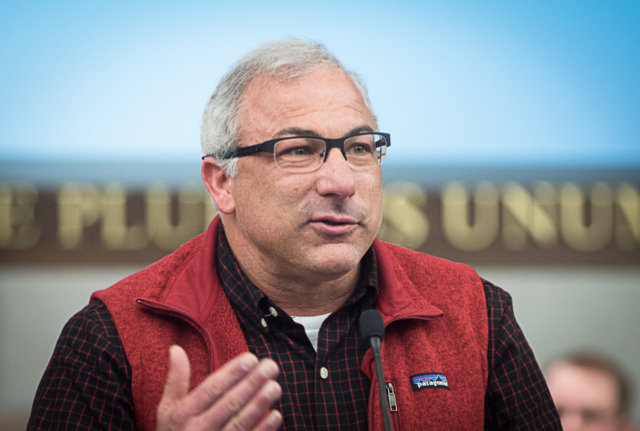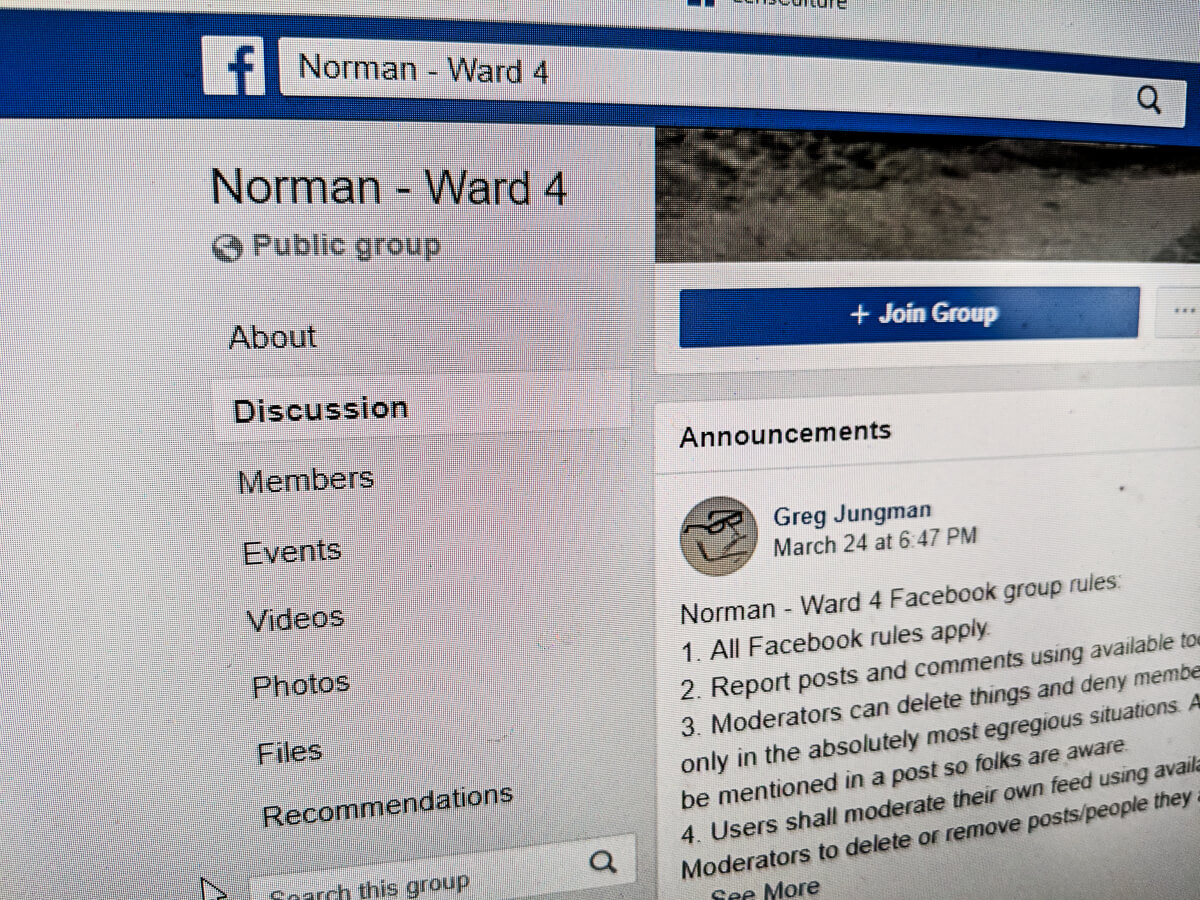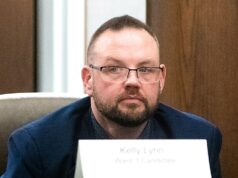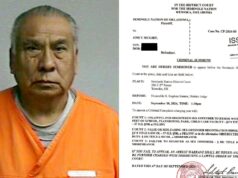

A case that has broad ramifications for how government officials use social media and what constitutes public data is underway in a Norman court.
Tuesday, Cleveland County District Judge Thad Balkman heard arguments in a lawsuit brought by Casey Holcomb against the City of Norman and Councilman Bill Hickman alleging the official censored posts critical of the councilman on the Norman Ward 4 Facebook page. Holcomb is asking for a court order to compel Hickman and the City to reinstate the Facebook posts and prohibit further deletions.
The case to decide whether the ward’s Facebook page is a public forum to be protected from “viewpoint discrimination” is the first of its kind in a state court venue in the U.S., said Camille Fischer, a lawyer for the free speech advocacy non-profit Electronic Frontier Foundation. But similar cases are pending or on appeal in the federal court system.
The lawsuits, including one filed against President Donald Trump, claim government censorship of comments to social media posts — the “interactive spaces” — violates constitutional free speech protections. At issue in the Oklahoma case is whether an elected official may remove or restrict views expressed on a social media page created by the official or one where they are an administrator.
In cases where a government entity has not sanctioned or authorized the social media page, the lawsuits raise additional questions about where to draw the line between a public forum and the constitutionally protected act of a private citizen who also happens to be a public official.
“What we have here is a long practice of Mr. Hickman controlling a message in a public forum, and we believe that is unconstitutional,” said Kevin Kemper, a Norman lawyer representing Holcomb.
Kemper said Councilman Hickman, who lost in his bid to be Norman mayor in a February election, became an administrator of the page in 2016 after being elected to the Norman City Council Ward 4 seat. Kemper said Hickman deleted 132 allegedly unflattering Facebook posts and removed nine members from the group between 2016 and 2017. Kemper said Hickman then removed another 117 comments in 2018.
Kemper said discovery in the lawsuit — such as written questions required to be answered by parties, or deposition testimony — will be necessary to determine the extent of the alleged censorship and the city’s knowledge or involvement.
Anything Hickman did with the page was the act of a private citizen and not the city government, said Norman Assistant City Attorney Rick Knighton. He said the city manager, staff and city council as a whole had no managerial control of the Facebook page.
Knighton, who was representing the city and Hickman in his official councilman capacity (but not as an individual), told Balkman that because the plaintiffs in the lawsuit cannot establish the City of Norman sanctioned or had control over the page or Hickman’s conduct, then Holcomb has not been harmed by the city and lacks legal standing to bring the lawsuit against the municipality. Knighton said the Norman City Council had struggled with implementing a social media policy and could not reach a consensus because of concerns any rules would end up also infringing upon any single city councilman’s free speech rights.
Hickman did not attend this week’s hearing, but he later denied the allegations against him.
“Mr. Holcomb is a political activist, and this lawsuit is politically motivated,” Hickman said.
Hickman: ‘I regret letting what I believed to be personal attacks upset me’

Hickman removed himself as an administrator of the page in 2019, but Holcomb’s lawyers say he has since “flagged” certain comments for existing administrators.
Hickman apologized in a December post for censoring the page.
“I want to apologize to the members of the Ward 4 FB group for my recent and limited acts of either turning off comments or deleting posts,” Hickman wrote. “It is my fault, and I regret letting what I believed to be personal attacks upset me. To make it right, I will refrain from exercising any admin powers for at least as long as the mayoral campaign is on-going.”
In February, Holcomb brought suit alleging prior restraint through viewpoint discrimination and asking Balkman to issue a court order requiring those posts to be reinstated and prohibiting future censorship. In their pleadings, city attorneys pointed out that Holcomb was an outspoken critic of Hickman, including having established a parody Facebook page that posted satirical videos of the Ward 4 councilman. Holcomb’s lawyers describe Holcomb as an “advocacy journalist, author and activist.”
Hickman was not present at Tuesday’s hearing. Lawyers for Holcomb said he had not yet been served the suit papers. Balkman said he would not make a ruling on the request for a permanent injunction until the hearing in August, after Hickman had an opportunity to respond to the allegations in court.
Knighton said he will likely file a motion asking the court to dismiss the lawsuit before the August hearing, where both Holcomb and Hickman would be expected to testify.
Eight of Norman’s wards have Facebook pages. Five of them have a city council member as administrators who have the ability to delete or turn off comments.
Knighton wrote in court pleadings that the Norman Ward 4 Facebook page was established in 2012 by former Councilman Greg Jungman so that neighbors could share questions and discuss news and issues pertinent to their ward. Jungman is one of three current administrators of the page.
“Council members have First Amendment rights same as all others. The city doesn’t have managerial control over council members,” Knighton said.
EFF lawyer Camille Fischer said the city was aware of Hickman’s post deletions and had considered establishing a social media policy for city employees and councilmen, but that did not happen.
“So, the City Council’s inaction here allows Mr. Hickman to engage in this unconstitutional activity,” Fischer said. She argued that was enough to establish the city’s liability.
Knighton said recent case law from other pending federal suits has required there to be a clear connection between the government’s policy or practice and the social media publication. He said the City of Norman has no control over the Ward 4 Facebook page and had no power to restore prior posts or protect speech on the private page.
Trump case looms over Norman situation
One of the recent cases discussed in the hearing was a lawsuit against President Trump alleging his administration’s deletion of certain comments to his Twitter posts was unconstitutional viewpoint discrimination.
Balkman said during Tuesday’s hearing that, in the case of Knight First Amendment Institute v. Trump, the president’s pre-election private Twitter page “morphed” into what became his official presidential account. Balkman may have been signalling that the argument could be made that, when Hickman became the administrator, his involvement in an existing Facebook page changed its nature to one officially sanctioned by the city.
White House Press Secretary Sarah Sanders was dismissed from the Trump lawsuit because she did not have managerial control over the President’s Twitter account. Likewise, whether the City of Norman legally had “control” over the Norman Ward 4 Facebook page is an issue before Balkman.
Typically, First Amendment lawsuits end up in federal court, but Kemper told the judge he believed the state district court was better suited to understand the local public interest at stake in the litigation. He said Norman heralds itself as a community that sets standards for the state, and this was an opportunity to do just that.
“I take a great deal of pride being from Oklahoma, and I am of the opinion that this court, a district court in Oklahoma, can exercise our Oklahoma sensibilities,” Kemper said. “This is not what we envision our government to be doing, which is asserting itself into whether or not people can make public expressions.”





















